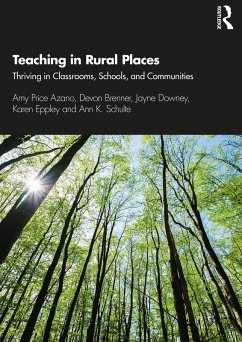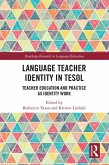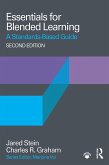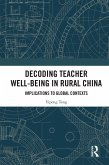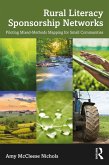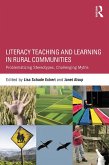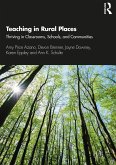Amy Price Azano, Devon Brenner, Jayne Downey, Karen Eppley, Ann K. Schulte
Teaching in Rural Places (eBook, ePUB)
Thriving in Classrooms, Schools, and Communities
42,95 €
42,95 €
inkl. MwSt.
Sofort per Download lieferbar

21 °P sammeln
42,95 €
Als Download kaufen

42,95 €
inkl. MwSt.
Sofort per Download lieferbar

21 °P sammeln
Jetzt verschenken
Alle Infos zum eBook verschenken
42,95 €
inkl. MwSt.
Sofort per Download lieferbar
Alle Infos zum eBook verschenken

21 °P sammeln
Amy Price Azano, Devon Brenner, Jayne Downey, Karen Eppley, Ann K. Schulte
Teaching in Rural Places (eBook, ePUB)
Thriving in Classrooms, Schools, and Communities
- Format: ePub
- Merkliste
- Auf die Merkliste
- Bewerten Bewerten
- Teilen
- Produkt teilen
- Produkterinnerung
- Produkterinnerung

Bitte loggen Sie sich zunächst in Ihr Kundenkonto ein oder registrieren Sie sich bei
bücher.de, um das eBook-Abo tolino select nutzen zu können.
Hier können Sie sich einloggen
Hier können Sie sich einloggen
Sie sind bereits eingeloggt. Klicken Sie auf 2. tolino select Abo, um fortzufahren.

Bitte loggen Sie sich zunächst in Ihr Kundenkonto ein oder registrieren Sie sich bei bücher.de, um das eBook-Abo tolino select nutzen zu können.
This teacher education textbook will help preservice and beginning teachers to think critically about the impact of rurality on their work by providing a thorough overview of what it means to live, teach, learn, and thrive as educators in a rural community.
- Geräte: eReader
- ohne Kopierschutz
- eBook Hilfe
- Größe: 5.73MB
Andere Kunden interessierten sich auch für
![Language Teacher Identity in TESOL (eBook, ePUB) Language Teacher Identity in TESOL (eBook, ePUB)]() Language Teacher Identity in TESOL (eBook, ePUB)40,95 €
Language Teacher Identity in TESOL (eBook, ePUB)40,95 €![Essentials for Blended Learning, 2nd Edition (eBook, ePUB) Essentials for Blended Learning, 2nd Edition (eBook, ePUB)]() Jared SteinEssentials for Blended Learning, 2nd Edition (eBook, ePUB)33,95 €
Jared SteinEssentials for Blended Learning, 2nd Edition (eBook, ePUB)33,95 €![Decoding Teacher Well-being in Rural China (eBook, ePUB) Decoding Teacher Well-being in Rural China (eBook, ePUB)]() Yipeng TangDecoding Teacher Well-being in Rural China (eBook, ePUB)44,95 €
Yipeng TangDecoding Teacher Well-being in Rural China (eBook, ePUB)44,95 €![Rural Literacy Sponsorship Networks (eBook, ePUB) Rural Literacy Sponsorship Networks (eBook, ePUB)]() Amy McCleese NicholsRural Literacy Sponsorship Networks (eBook, ePUB)44,95 €
Amy McCleese NicholsRural Literacy Sponsorship Networks (eBook, ePUB)44,95 €![Students, Places and Identities in English and the Arts (eBook, ePUB) Students, Places and Identities in English and the Arts (eBook, ePUB)]() Students, Places and Identities in English and the Arts (eBook, ePUB)51,95 €
Students, Places and Identities in English and the Arts (eBook, ePUB)51,95 €![Literacy Teaching and Learning in Rural Communities (eBook, ePUB) Literacy Teaching and Learning in Rural Communities (eBook, ePUB)]() Literacy Teaching and Learning in Rural Communities (eBook, ePUB)51,95 €
Literacy Teaching and Learning in Rural Communities (eBook, ePUB)51,95 €![Teaching in Rural Places (eBook, PDF) Teaching in Rural Places (eBook, PDF)]() Amy Price AzanoTeaching in Rural Places (eBook, PDF)42,95 €
Amy Price AzanoTeaching in Rural Places (eBook, PDF)42,95 €-
-
-
This teacher education textbook will help preservice and beginning teachers to think critically about the impact of rurality on their work by providing a thorough overview of what it means to live, teach, learn, and thrive as educators in a rural community.
Dieser Download kann aus rechtlichen Gründen nur mit Rechnungsadresse in A, B, BG, CY, CZ, D, DK, EW, E, FIN, F, GR, HR, H, IRL, I, LT, L, LR, M, NL, PL, P, R, S, SLO, SK ausgeliefert werden.
Produktdetails
- Produktdetails
- Verlag: Taylor & Francis eBooks
- Seitenzahl: 292
- Erscheinungstermin: 16. Dezember 2020
- Englisch
- ISBN-13: 9781000220438
- Artikelnr.: 60704549
- Verlag: Taylor & Francis eBooks
- Seitenzahl: 292
- Erscheinungstermin: 16. Dezember 2020
- Englisch
- ISBN-13: 9781000220438
- Artikelnr.: 60704549
- Herstellerkennzeichnung Die Herstellerinformationen sind derzeit nicht verfügbar.
Amy Price Azano is a teacher educator in the School of Education at Virginia Tech. She grew up in Virginia's Shenandoah Valley and focuses her scholarship on issues of equity for rural learners.
Devon Brenner transplanted from Michigan to Mississippi over 20 years ago. A professor of literacy teacher education at Mississippi State University, she engages in research that focuses on rural education policy and practice.
Jayne Downey is a professor at Montana State University where she directs the Center for Research on Rural Education. Born and raised on a farm on the prairies, her research and service are dedicated to working with and for rural schools and communities around the world.
Karen Eppley is a former fifth grade teacher who has lived her entire life in one rural valley. Her research interest is at the intersection of literacy education and rural education. She is an associate professor of curriculum and instruction at Penn State University where she teaches in the reading specialist certification program.
Ann K. Schulte is a professor at California State University, Chico. She has been a teacher and teacher educator in primarily rural contexts for 30 years. Her scholarship interests focus on self-study, teacher identity, and university-community partnerships in rural contexts.
Devon Brenner transplanted from Michigan to Mississippi over 20 years ago. A professor of literacy teacher education at Mississippi State University, she engages in research that focuses on rural education policy and practice.
Jayne Downey is a professor at Montana State University where she directs the Center for Research on Rural Education. Born and raised on a farm on the prairies, her research and service are dedicated to working with and for rural schools and communities around the world.
Karen Eppley is a former fifth grade teacher who has lived her entire life in one rural valley. Her research interest is at the intersection of literacy education and rural education. She is an associate professor of curriculum and instruction at Penn State University where she teaches in the reading specialist certification program.
Ann K. Schulte is a professor at California State University, Chico. She has been a teacher and teacher educator in primarily rural contexts for 30 years. Her scholarship interests focus on self-study, teacher identity, and university-community partnerships in rural contexts.
Introduction
Section One: Rural Contexts
1: Becoming a Rural Teacher
2: Social Justice and Rural Communities
3: Understanding Rural Places
4: Why Place Matters
Section Two: Thriving in Rural Communities
5: Rural Literacies
6: Understanding Strengths and Assets in Rural Communities
7: Families as Partners in Rural Communities
8: From Here or Away: Relating to Students
Section Three: Thriving in Rural Schools
9: Building Professional Networks in Rural Schools
10: Policy and the Rural Teacher
11: Responding to Trauma
12: Multi-grade Teaching
Section Four: Thriving in Rural Classrooms
13: Place-Conscious Instruction
14: Technology for Learning in the Rural Classroom
15: Diversity in the Rural Classroom
16: Teaching Exceptional Learners in Rural Classrooms
17: Evidence in the Rural Classroom
18: Teaching as Inquiry: What Works in Rural Classrooms
19: Thriving as a Rural Teacher
Section One: Rural Contexts
1: Becoming a Rural Teacher
2: Social Justice and Rural Communities
3: Understanding Rural Places
4: Why Place Matters
Section Two: Thriving in Rural Communities
5: Rural Literacies
6: Understanding Strengths and Assets in Rural Communities
7: Families as Partners in Rural Communities
8: From Here or Away: Relating to Students
Section Three: Thriving in Rural Schools
9: Building Professional Networks in Rural Schools
10: Policy and the Rural Teacher
11: Responding to Trauma
12: Multi-grade Teaching
Section Four: Thriving in Rural Classrooms
13: Place-Conscious Instruction
14: Technology for Learning in the Rural Classroom
15: Diversity in the Rural Classroom
16: Teaching Exceptional Learners in Rural Classrooms
17: Evidence in the Rural Classroom
18: Teaching as Inquiry: What Works in Rural Classrooms
19: Thriving as a Rural Teacher
Introduction
Section One: Rural Contexts
1: Becoming a Rural Teacher
2: Social Justice and Rural Communities
3: Understanding Rural Places
4: Why Place Matters
Section Two: Thriving in Rural Communities
5: Rural Literacies
6: Understanding Strengths and Assets in Rural Communities
7: Families as Partners in Rural Communities
8: From Here or Away: Relating to Students
Section Three: Thriving in Rural Schools
9: Building Professional Networks in Rural Schools
10: Policy and the Rural Teacher
11: Responding to Trauma
12: Multi-grade Teaching
Section Four: Thriving in Rural Classrooms
13: Place-Conscious Instruction
14: Technology for Learning in the Rural Classroom
15: Diversity in the Rural Classroom
16: Teaching Exceptional Learners in Rural Classrooms
17: Evidence in the Rural Classroom
18: Teaching as Inquiry: What Works in Rural Classrooms
19: Thriving as a Rural Teacher
Section One: Rural Contexts
1: Becoming a Rural Teacher
2: Social Justice and Rural Communities
3: Understanding Rural Places
4: Why Place Matters
Section Two: Thriving in Rural Communities
5: Rural Literacies
6: Understanding Strengths and Assets in Rural Communities
7: Families as Partners in Rural Communities
8: From Here or Away: Relating to Students
Section Three: Thriving in Rural Schools
9: Building Professional Networks in Rural Schools
10: Policy and the Rural Teacher
11: Responding to Trauma
12: Multi-grade Teaching
Section Four: Thriving in Rural Classrooms
13: Place-Conscious Instruction
14: Technology for Learning in the Rural Classroom
15: Diversity in the Rural Classroom
16: Teaching Exceptional Learners in Rural Classrooms
17: Evidence in the Rural Classroom
18: Teaching as Inquiry: What Works in Rural Classrooms
19: Thriving as a Rural Teacher
